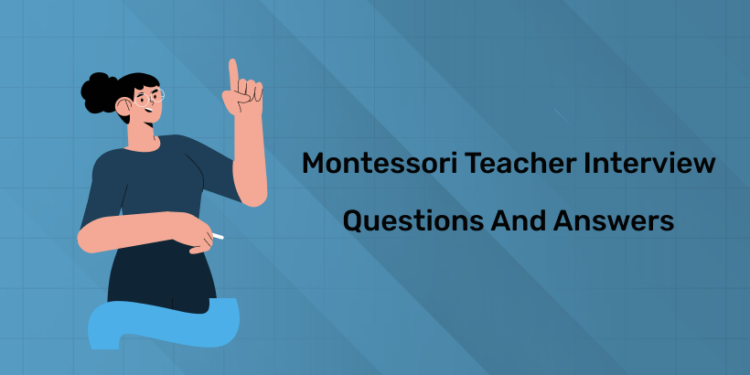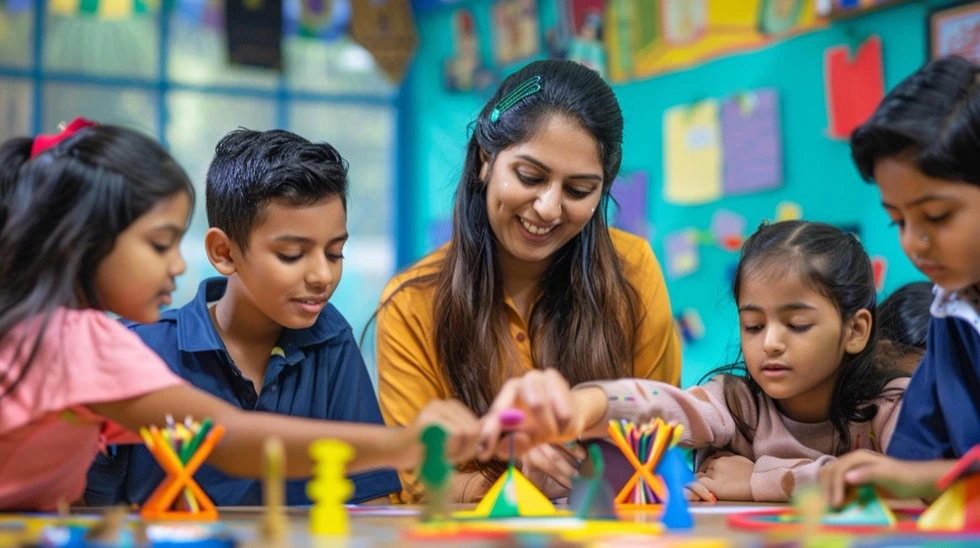Table of Contents
Are you preparing for a Montessori teacher interview? Knowing the right answers can help you land your dream job! In this guide, you’ll find the most asked interview questions with expert answers to help you ace your interview with confidence!”
Montessori Teacher Interview – Significance
A Montessori teacher interview is a vital step for educators. It’s for those wanting to adopt the unique Montessori approach. Candidates are assessed on their qualifications. More importantly, their understanding and commitment to Maria Montessori’s philosophy are evaluated.
- Questions often revolve around the integration of these principles into teaching methods, emphasizing the importance of hands-on, child-led learning experiences.
- Additionally, candidates are probed on their ability to create a prepared environment that fosters independence and accommodates the diverse needs of students in mixed-age classrooms.
- Beyond theoretical understanding, the interview process seeks to uncover the candidate’s real-world application of Montessori practices.
- This may involve sharing examples of successful Montessori lessons, demonstrating how the candidate promotes independence in students, handles behavioral challenges, and incorporates outdoor education or cultural diversity into their curriculum.
The Montessori teacher interview is a comprehensive evaluation of a candidate’s alignment with the Montessori philosophy, their creativity in adapting teaching methods, and their capacity to inspire and guide students on a journey of self-discovery and lifelong learning. It’s an opportunity for educators to showcase not only their educational expertise but also their dedication to fostering a love for learning in the hearts of young minds within the Montessori framework.
Enroll in Montessori Teachers Training Course!
Montessori Teacher Interview – Insights
1: What is the primary focus of the first plane of development in the Montessori method?
The Montessori teacher interview encompasses a series of thought-provoking questions designed to assess a candidate’s depth of understanding and practical application of the Montessori philosophy. These questions delve into various facets of a candidate’s approach to education, ranging from the fundamental principles of the Montessori method to real-life scenarios in the classroom.
Montessori Teacher Interview – Tips and Tricks
Securing success in a Montessori teacher interview involves not only a solid understanding of Montessori principles but also a strategic approach to articulating one’s philosophy and experiences. First and foremost, candidates should delve deeply into the Montessori philosophy, ensuring they can eloquently explain its core principles, such as child-led learning and independence.
- A key tip is to align personal experiences with these principles, offering tangible examples of successful Montessori lessons or instances where the candidate has witnessed the transformative impact of the methodology.
- Another crucial aspect is the ability to discuss classroom management strategies specific to Montessori.
- Demonstrating how a candidate fosters independence, handles behavioral challenges, and promotes a positive, inclusive environment provides a holistic view of their teaching approach.
- Sharing real-life scenarios, whether from previous teaching experiences or personal observations, can make responses more impactful.
- Moreover, candidates should emphasize their commitment to ongoing professional development in Montessori education.
- This may include attending workshops, engaging with Montessori communities, and staying updated on current trends and best practices.
- This not only showcases a dedication to continuous improvement but also highlights an eagerness to evolve within the dynamic Montessori landscape.
- Additionally, candidates should prepare for questions that explore their adaptability and creativity in tailoring lessons to individual student needs.
- Flexibility in adapting to the diverse dynamics of a mixed-age classroom is a quality highly valued in Montessori educators.
- By offering solutions with multiple approaches and demonstrating a willingness to customize teaching methods, candidates can exemplify their versatility.
Success in a Montessori teacher interview hinges on a combination of in-depth knowledge, practical examples, and a genuine passion for the Montessori philosophy. The ability to connect personal experiences with Montessori principles, coupled with a commitment to ongoing professional growth, positions candidates as educators who not only understand the methodology but can effectively implement it in the classroom.
Montessori Teacher Interview – Conclusion
The questions posed are carefully curated to delve into the candidate’s understanding of core concepts like child-led learning, independence, and holistic development. Through these inquiries, interviewers seek to unravel not only the theoretical knowledge but, more critically, the practical application of Montessori philosophy in a classroom setting.Candidates can anticipate a line of questioning that prompts them to articulate their unique approach to integrating Montessori principles into their teaching methods.
The Montessori teacher interview thoroughly evaluates candidates. It checks their philosophy, teaching methods, and ability to foster child development. Interviewers seek specific examples of hands-on activities or special materials used for immersive learning. This assesses not just theoretical knowledge, but also the candidate’s practical application of Montessori principles.
Get Certified & Start Your Montessori Career
Montessori Teacher Training Course by Entri App: Gain expert skills, earn certification, and kickstart your teaching career.
Join Now!Frequently Asked Questions
What are some typical questions asked in a Montessori Teacher interview?
Typical questions may include:
How should I prepare for a Montessori Teacher interview?
To prepare:
- Understand Montessori principles and practices thoroughly.
- Reflect on experiences applying Montessori methods.
- Be ready to share specific examples of successful lessons.
- Demonstrate understanding of mixed-age classrooms.
- Highlight ability to promote independence and individualized learning.
- Emphasize commitment to continuous professional development.
What qualities do Montessori schools look for in a prospective teacher?
Montessori schools seek teachers with:
- Deep understanding and alignment with Montessori philosophy.
- Strong observational and adaptability skills.
- Creativity in lesson planning and material design.
- Excellent communication and collaboration abilities.
- A commitment to fostering independence and self-directed learning.
- Flexibility and the ability to handle mixed-age classrooms.
Can you provide examples of situational questions asked during Montessori Teacher interviews?
Situational questions may include:
- How would you handle a conflict between two students in your Montessori classroom?
- If a child consistently finishes tasks quickly, how would you provide additional challenges?
- How do you adapt your teaching for a child with special needs in a Montessori setting?
- Describe a time when you had to manage unexpected changes in the classroom environment.
- What strategies would you use to foster a sense of community among your students?
How important is knowledge of Montessori philosophy and principles in the interview process?
Knowledge of Montessori philosophy is crucial. Interviewers assess understanding of child-led learning, independence, and creating a prepared environment. Practical examples of applying Montessori principles demonstrate a candidate’s proficiency and suitability.













